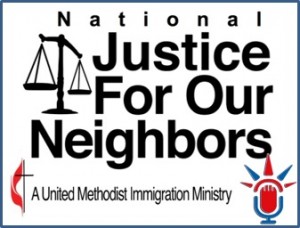In this episode we talk to Rob Rutland-Brown and the work he is doing as the Executive Director of the National Justice for Our Neighbors
Listen to this show using the web player below or your podcasting app of choice.
Subscribe via iTunes or Stitcher to get the next episode when it is released
Rob Rutland-Brown is the Executive Director of the National Justice for Our Neighbors, a nonprofit organization headquartered in Springfield, VA just outside of Washington DC with satellite offices throughout the country. National Justice for Our Neighbors is a United Methodist ministry of hospitality that welcomes immigrants by providing affordable, high-quality immigration legal services for low-income immigrants, engaging in advocacy for immigrant rights, and offering education to communities of faith as well as the public. Rob received his Bachelor’s in Psychology and History from Emory University and a Master’s in Nonprofit Management from Georgia State University. Has has since worked in the immigration focused nonprofit sector for over a decade.
 About the National Justice for Our Neighbors
About the National Justice for Our Neighbors
National Justice for Our Neighbors discusses their hospitality ministry that welcomes immigrants by providing affordable, high-quality immigration legal services to low-income immigrants, engaging in advocacy for immigrant rights, and offering education to communities of faith and the public.
National Justice for Our Neighbors (JFON) has sites around the country with staff attorneys and teams of volunteers that provide critical immigration legal services while connecting communities. Their work focuses on uniting families, helping vulnerable immigrants to escape violence, and enabling eligible immigrants to receive authorization to work.
In 2015, the JFON network has handled nearly 7,000 cases for 3,000 clients from 125 countries. This includes 700 DACA cases for young dreamers seeking to work and attend college, 500 cases for victims of domestic violence or other violent crimes, 200 asylum cases, 150 refugee adjustment cases, and 3,000 advice and counsel cases for those needing to know their options under immigration law. Their network consists of 15 sites across the country that operate 40 clinics, most of which are run out of United Methodist Churches. The have 25 staff attorneys and more than 50 pro bono attorneys, along with hundreds of additional volunteers, but always need more.
In addition to direct legal services, JFON also engages in education and advocacy. They give Know Your Rights presentations to immigrants so that they understand how laws apply to immigrants in the U.S., regardless of immigration status. They talk to Sunday school classes, community groups, and the general public about how our immigration system works, dispelling myths that often circulate about immigrants within our communities. They advocate by raising our collective voices for reforms to our immigration laws that are unjust. For example, this year we have sought to end the harmful practice of family detention, and urged for Deferred Action for the Parents of Americans and Lawful Permanent Residents (DAPA) to come to fruition so that parents of American children can work and not fear deportation.
In the coming year, we have several exciting projects aimed at serving the most vulnerable immigrants in our communities. In South Florida, JFON will be initiating a mobile clinic to provide services in areas of high unmet need, including to rural farm workers, who are unable to come to our office. In Houston, which has more victims of trafficking than anywhere in the country, they will be expanding our work with trafficked immigrants to enable them to remain in the U.S., permanently and safely. In Austin, they will focus on serving unaccompanied migrant children who have fled El Salvador, Honduras, and Guatemala due to extreme violence there. These children have arrived here alone and need access to legal services in order to remain here in safety. Unaccompanied migrant children who are represented in court by an immigration attorney are five times more likely to receive lawful status here than those who are not.
Some JFON sites have minimal fees for their clients, but most are free. This is because JFON serves only clients who are low-income and have nowhere else to turn for trustworthy, quality immigration legal services. In order to fund the work, JFON sites receive funding from churches, private foundations, and individuals.
Every day, JFONs across the country receive calls from more clients seeking assistance than they can begin to serve. Their volunteer-based model allows them to help as many clients as possible while keeping costs down and connecting individuals from different backgrounds. Pro-bono attorneys assist staff attorneys with cases, or in some cases take on cases directly. Other volunteers help with interpreting, handling the phones, conducting initial intake interviews, providing food, engaging in childcare, and much more. This assistance allows them to be more efficient and also to build community through opportunities to better know one another.


Leave a Reply